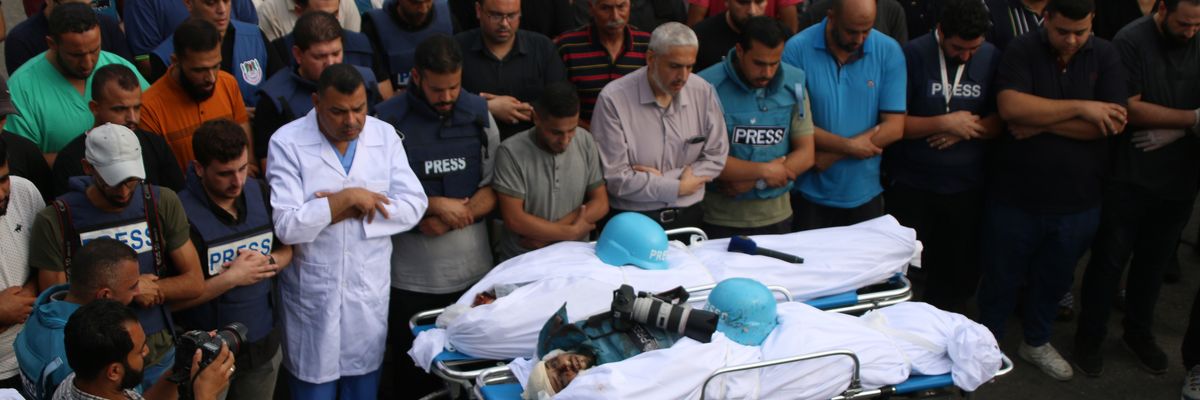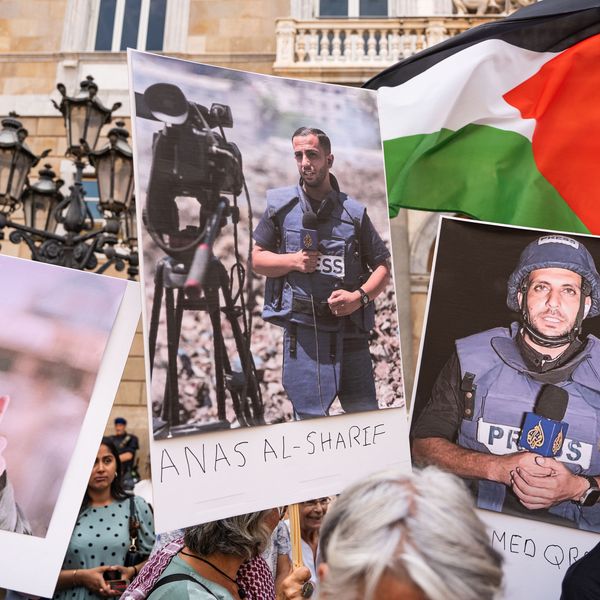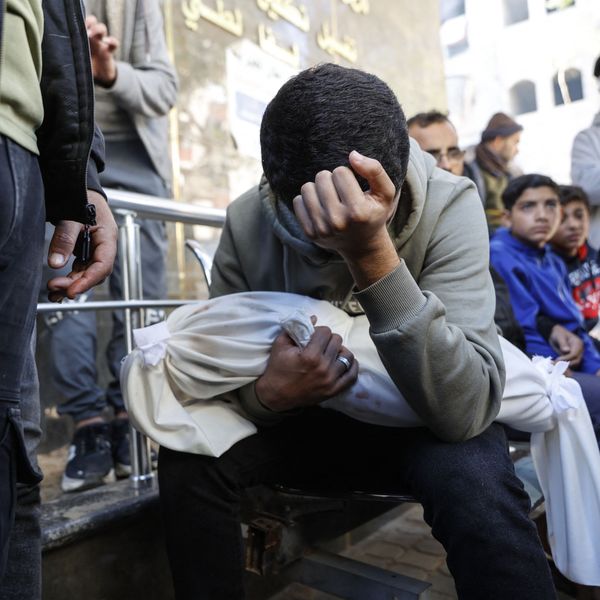
Friends and relatives mourn the deaths of Palestinian journalists Muhammad Sobh and Saeed Al-Taweel, who were killed during their work by Israeli airstrikes on October 10, 2023 in Gaza City, Gaza.
At Least 15 Journalists Have Been Killed in Israel, Gaza, and Lebanon Since War Began
"Journalists are civilians doing important work during times of crisis and must not be targeted by warring parties," said Sherif Mansour of the Committee to Protect Journalists.
The Committee to Protect Journalists said Tuesday that at least 15 reporters and photographers have been killed in the 10 days since Hamas' deadly attack on Israel, which the latter met with a massive bombing campaign in the occupied Gaza Strip.
Among the 15 journalists killed in just over a week of war, according to CPJ, 11 were Palestinian, three were Israeli, and one was Lebanese. CPJ published the names of the killed journalists on its website.
The list includes Salam Mema, a freelance journalist who served as head of the Women Journalists Committee at the Palestinian Media Assembly. She was killed by an Israeli airstrike that hit her home in Gaza's Jabalia refugee camp.
Also on the list is Yaniv Zohar, an Israeli photographer who was killed during Hamas' October 7 attack on Israel.
Issam Abdallah, a Beirut-based videographer for the Reuters and the one Lebanese journalist on the list, was killed by Israeli shelling near the Lebanon border. Abdallah was with other journalists who were "clearly identifiable" as members of the press, Reporters Without Borders said over the weekend.
"Journalists are civilians doing important work during times of crisis and must not be targeted by warring parties," Sherif Mansour, CPJ's Middle East and North Africa program coordinator, said in a statement. "Journalists across the region are making great sacrifices to cover this heartbreaking conflict. All parties must take steps to ensure their safety."
CPJ said it is currently investigating more than 100 reports of additional journalists being "killed, missing, detained, or threatened" as they attempt to cover the devastating conflict, which has left thousands dead in Israel and Gaza and intensified the existing humanitarian crisis in the occupied Palestinian enclave.
The group also said it is looking into reports of "damage to media offices and journalists' homes."
Threats to journalists, particularly those working in Gaza, have intensified in recent days as the Israeli military has ramped up its airstrikes, which have killed more than 2,700 people and decimated the territory's civilian infrastructure, including its internet service and communication providers.
"While major U.S. networks scrambled to ship star TV anchors to the relative safety of Israel, journalists within the 140-square-mile Gaza Strip are contending with a massive bombing campaign, electrical and internet outages, food and water shortages, and the psychological burden of reporting on the unfolding humanitarian crisis while living it themselves," The Washington Post's Laura Wagner reported Monday.
As Mondoweiss Gaza correspondent Tareq Hajjaj put it in a column on Sunday, "Every time I go into the field for work, I'm keenly aware that it feels like I'm taking a direct route to my own grave."
"I wear my vest with the word 'PRESS' emblazoned on it like a shield, and I cover my head with a blue helmet, thinking this will protect me, that I will be recognized as a journalist and spared Israel's missiles," Hajjaj wrote. "But it won't protect me. My colleagues are slain every day."
Christophe Deloire, secretary-general of Reporters Without Borders (RSF), said in a statement that Israel's "indiscriminate response to the horrific massacre committed by Hamas" has put journalists and other civilians in the Gaza Strip at unacceptable risk.
"We solemnly call on the Israeli authorities to put an end to military practices that violate international law and result in the deaths of civilians, including journalists," said Deloire. "RSF calls on the parties involved to implement their obligations to protect journalists during conflicts, and on international institutions to ensure that these protection measures are respected."
An Urgent Message From Our Co-Founder
Dear Common Dreams reader, The U.S. is on a fast track to authoritarianism like nothing I've ever seen. Meanwhile, corporate news outlets are utterly capitulating to Trump, twisting their coverage to avoid drawing his ire while lining up to stuff cash in his pockets. That's why I believe that Common Dreams is doing the best and most consequential reporting that we've ever done. Our small but mighty team is a progressive reporting powerhouse, covering the news every day that the corporate media never will. Our mission has always been simple: To inform. To inspire. And to ignite change for the common good. Now here's the key piece that I want all our readers to understand: None of this would be possible without your financial support. That's not just some fundraising cliche. It's the absolute and literal truth. We don't accept corporate advertising and never will. We don't have a paywall because we don't think people should be blocked from critical news based on their ability to pay. Everything we do is funded by the donations of readers like you. Will you donate now to help power the nonprofit, independent reporting of Common Dreams? Thank you for being a vital member of our community. Together, we can keep independent journalism alive when it’s needed most. - Craig Brown, Co-founder |
The Committee to Protect Journalists said Tuesday that at least 15 reporters and photographers have been killed in the 10 days since Hamas' deadly attack on Israel, which the latter met with a massive bombing campaign in the occupied Gaza Strip.
Among the 15 journalists killed in just over a week of war, according to CPJ, 11 were Palestinian, three were Israeli, and one was Lebanese. CPJ published the names of the killed journalists on its website.
The list includes Salam Mema, a freelance journalist who served as head of the Women Journalists Committee at the Palestinian Media Assembly. She was killed by an Israeli airstrike that hit her home in Gaza's Jabalia refugee camp.
Also on the list is Yaniv Zohar, an Israeli photographer who was killed during Hamas' October 7 attack on Israel.
Issam Abdallah, a Beirut-based videographer for the Reuters and the one Lebanese journalist on the list, was killed by Israeli shelling near the Lebanon border. Abdallah was with other journalists who were "clearly identifiable" as members of the press, Reporters Without Borders said over the weekend.
"Journalists are civilians doing important work during times of crisis and must not be targeted by warring parties," Sherif Mansour, CPJ's Middle East and North Africa program coordinator, said in a statement. "Journalists across the region are making great sacrifices to cover this heartbreaking conflict. All parties must take steps to ensure their safety."
CPJ said it is currently investigating more than 100 reports of additional journalists being "killed, missing, detained, or threatened" as they attempt to cover the devastating conflict, which has left thousands dead in Israel and Gaza and intensified the existing humanitarian crisis in the occupied Palestinian enclave.
The group also said it is looking into reports of "damage to media offices and journalists' homes."
Threats to journalists, particularly those working in Gaza, have intensified in recent days as the Israeli military has ramped up its airstrikes, which have killed more than 2,700 people and decimated the territory's civilian infrastructure, including its internet service and communication providers.
"While major U.S. networks scrambled to ship star TV anchors to the relative safety of Israel, journalists within the 140-square-mile Gaza Strip are contending with a massive bombing campaign, electrical and internet outages, food and water shortages, and the psychological burden of reporting on the unfolding humanitarian crisis while living it themselves," The Washington Post's Laura Wagner reported Monday.
As Mondoweiss Gaza correspondent Tareq Hajjaj put it in a column on Sunday, "Every time I go into the field for work, I'm keenly aware that it feels like I'm taking a direct route to my own grave."
"I wear my vest with the word 'PRESS' emblazoned on it like a shield, and I cover my head with a blue helmet, thinking this will protect me, that I will be recognized as a journalist and spared Israel's missiles," Hajjaj wrote. "But it won't protect me. My colleagues are slain every day."
Christophe Deloire, secretary-general of Reporters Without Borders (RSF), said in a statement that Israel's "indiscriminate response to the horrific massacre committed by Hamas" has put journalists and other civilians in the Gaza Strip at unacceptable risk.
"We solemnly call on the Israeli authorities to put an end to military practices that violate international law and result in the deaths of civilians, including journalists," said Deloire. "RSF calls on the parties involved to implement their obligations to protect journalists during conflicts, and on international institutions to ensure that these protection measures are respected."
The Committee to Protect Journalists said Tuesday that at least 15 reporters and photographers have been killed in the 10 days since Hamas' deadly attack on Israel, which the latter met with a massive bombing campaign in the occupied Gaza Strip.
Among the 15 journalists killed in just over a week of war, according to CPJ, 11 were Palestinian, three were Israeli, and one was Lebanese. CPJ published the names of the killed journalists on its website.
The list includes Salam Mema, a freelance journalist who served as head of the Women Journalists Committee at the Palestinian Media Assembly. She was killed by an Israeli airstrike that hit her home in Gaza's Jabalia refugee camp.
Also on the list is Yaniv Zohar, an Israeli photographer who was killed during Hamas' October 7 attack on Israel.
Issam Abdallah, a Beirut-based videographer for the Reuters and the one Lebanese journalist on the list, was killed by Israeli shelling near the Lebanon border. Abdallah was with other journalists who were "clearly identifiable" as members of the press, Reporters Without Borders said over the weekend.
"Journalists are civilians doing important work during times of crisis and must not be targeted by warring parties," Sherif Mansour, CPJ's Middle East and North Africa program coordinator, said in a statement. "Journalists across the region are making great sacrifices to cover this heartbreaking conflict. All parties must take steps to ensure their safety."
CPJ said it is currently investigating more than 100 reports of additional journalists being "killed, missing, detained, or threatened" as they attempt to cover the devastating conflict, which has left thousands dead in Israel and Gaza and intensified the existing humanitarian crisis in the occupied Palestinian enclave.
The group also said it is looking into reports of "damage to media offices and journalists' homes."
Threats to journalists, particularly those working in Gaza, have intensified in recent days as the Israeli military has ramped up its airstrikes, which have killed more than 2,700 people and decimated the territory's civilian infrastructure, including its internet service and communication providers.
"While major U.S. networks scrambled to ship star TV anchors to the relative safety of Israel, journalists within the 140-square-mile Gaza Strip are contending with a massive bombing campaign, electrical and internet outages, food and water shortages, and the psychological burden of reporting on the unfolding humanitarian crisis while living it themselves," The Washington Post's Laura Wagner reported Monday.
As Mondoweiss Gaza correspondent Tareq Hajjaj put it in a column on Sunday, "Every time I go into the field for work, I'm keenly aware that it feels like I'm taking a direct route to my own grave."
"I wear my vest with the word 'PRESS' emblazoned on it like a shield, and I cover my head with a blue helmet, thinking this will protect me, that I will be recognized as a journalist and spared Israel's missiles," Hajjaj wrote. "But it won't protect me. My colleagues are slain every day."
Christophe Deloire, secretary-general of Reporters Without Borders (RSF), said in a statement that Israel's "indiscriminate response to the horrific massacre committed by Hamas" has put journalists and other civilians in the Gaza Strip at unacceptable risk.
"We solemnly call on the Israeli authorities to put an end to military practices that violate international law and result in the deaths of civilians, including journalists," said Deloire. "RSF calls on the parties involved to implement their obligations to protect journalists during conflicts, and on international institutions to ensure that these protection measures are respected."

